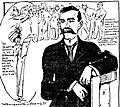Reed Smoot facts for kids
Reed Smoot (born January 10, 1862 – died February 9, 1941) was an important American politician. He served as a republican senator for Utah from 1903 to 1933. Smoot was also a leader in the Church of Jesus Christ of Latter-day Saints (often called the LDS Church) and a successful businessman.
One of the most well-known things he did as a senator was the 1930 Smoot–Hawley Tariff Act. This law changed taxes on goods coming into the United States.
Smoot was a very important leader in the LDS Church. He was chosen to be an apostle in the Quorum of the Twelve Apostles in 1900. This is a high leadership position. Smoot's role in the church led to some questions and discussions in the United States Senate. People wondered if his church duties would affect his work as a senator. There were also questions about his loyalty to the United States. A Senate committee looked into these questions during what were called the Reed Smoot hearings. The committee suggested that Smoot should be removed from the Senate, but the full Senate voted to let him stay. He lost his election in 1932 and returned to Utah in 1933. After that, Smoot focused on his work in the church. When he passed away, he was third in line to lead the LDS Church.
Contents
Who was Reed Smoot?
Early Life and Family
Reed Smoot was born in 1862 in Salt Lake City, which was then part of the Utah Territory. His father, Abraham O. Smoot, was a pioneer and had been the mayor of Salt Lake City. His mother was Anne Kristina Morrison Smoot. Reed Smoot's family moved to Provo, Utah, when his father was asked by Brigham Young to lead the church there.
Education and Early Career
Smoot went to school at the University of Utah and then graduated from Brigham Young Academy (which is now Brigham Young University) in Provo in 1879. After finishing school, Smoot served as a Mormon missionary in England. When he came back to Utah, he married Alpha M. Eldredge in 1884. They had six children together. Smoot then became a very successful businessman in the Salt Lake City area.
Church Leadership Role
In 1895, Smoot became more involved in the leadership of the LDS Church. On April 8, 1900, he was chosen to be an apostle and a member of the church's Quorum of the Twelve Apostles. This was a very important step in his life.
Serving in the United States Senate
Becoming a Senator
After becoming an apostle in 1900, Reed Smoot asked for and received permission from the LDS Church president, Joseph F. Smith, to run for political office in 1902. He joined the Republican Party.
On January 20, 1903, the Utah legislature voted for Smoot to become a U.S. Senator for the state. He was introduced to the Senate by Utah's other senator, Thomas Kearns.
Key Political Work
Smoot was re-elected many times and served in the Senate until March 1933. After 1913, a Constitutional amendment changed how senators were chosen, so people voted for them directly. Smoot lost his election in 1932, which was the same year that Democrat Franklin D. Roosevelt became president.
In 1916, Smoot helped create the National Park Service. He supported a law in the Senate that would establish this service. The law passed both the House of Representatives and the Senate. U.S. President Woodrow Wilson signed it into law on August 25, 1916. The National Park Service helps manage and protect America's national parks.
Smoot was also the Chairman of the Senate Finance Committee from 1923 to 1933. This committee deals with money and taxes for the country. He also worked on the Senate Appropriations Committee, which decides how government money is spent. He was active in the national Republican Party and attended their conventions.
The Smoot-Hawley Tariff Act
One of the most famous laws Smoot helped create was the Smoot-Hawley Tariff Act in 1930. He was a co-sponsor of this act. This law greatly increased the taxes on over 20,000 items imported into the United States. Many historians believe that this law made the Great Depression worse by making it harder for other countries to sell goods to the U.S. and buy American goods. U.S. President Herbert Hoover signed the act, and it became a law on June 17, 1930.
Images for kids




